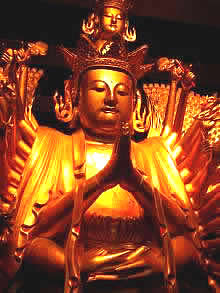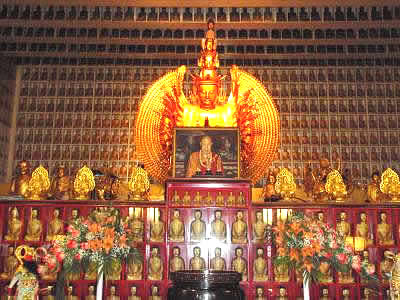 |
|
My Experience at the
City Of Ten Thousand Buddhas
From the November 1997 issue of Vajra Bodhi Sea
Spoken by Sam Lin, age 16venerable Master, Dharma Masters, laypeople, teachers and fellow classmates. Amitabha! My name is Sam Lin. I am currently a tenth grader.
Two years ago, someone introduced me to this place. At that time, I had many bad habits. My teachers often corrected and instructed me, but being stubborn and impetuous, I was only annoyed by their words. My temper grew greater each day. Sometimes I argued with the teachers. Whenever my parents called, I would complain about the school and the teachers. My parents advised me several times not to go against the teachers, saying, “No place is perfect. The teachers are all volunteers. It’s best to look at the good qualities of people, rather than be a fault-finder.” I couldn’t accept their advice. The school had sent a report of my behavior to my parents who felt really sad and didn’t know how to deal with me.
During winter break, my father came and had a meeting with the teachers about my misbehavior. My father was so sad that tears fell from his eyes. In a split second, I realized how unfilial I had been all my life. I had never seen my father cry even when he was going through the most difficult times. It felt as if thousands of swords were stabbing my heart: I had hurt his feelings and let him down. From then on, I resolved to behave properly and do my best to help out in the monastery. And so I started to recite the Buddha’s name and the Great Compassion Mantra, although only intermittently. Whenever I recited, I would feel an ineffable silence and peace in my mind. During the evening ceremony I would reflect upon my own faults and ask myself how I could improve. My afflictions and desires lessened, and my concentration power increased. It must have been due to the merit and virtue of reciting and the aid of Guanshiyin Bodhisattva.

I’d also like to share my thoughts about cooking in the kitchen last semester. By that time, I truly recognized the difficulties and hardships of the kitchen staff. They work from 5 o’clock in the morning till 6 or 7 in the evening. They sort, clean, cut, and cook the vegetables, wash the dishes, wipe the tables, sweep and mop the floor, clean the restrooms, and so on...the work is endless. What’s more, they have to worry about whether or not people like the food. They have worn themselves out to keep us happy and healthy. Sometimes a Dharma Master would ask how the food was, and I would hasten to say, “Of course it’s delicious!” In my mind I would think, “You work so hard to serve the assembly, not minding the cold and heat; the food you make is the sweetest, and it’s prepared with the greatest love!” Not knowing how lucky we are, we students criticize this and that, and have absolutely no idea of how hard these people work.
Many people don’t realize that the kitchen staff not only has to cook delicious meals for the assembly, but also has to deal with the leftovers. Many of the staff, who eat only one meal a day, have to eat the leftovers, and yet they never make a single complaint. I am very moved by their tremendous kindness and don’t know how I can ever repay them.
I have learned that if we always have a thankful heart, we will certainly see the bright side of our human nature and live happily every day. We will not complain about others but instead, reflect upon our own shortcomings and quickly change them. Isn’t this the meaning of Venerable Master Hua’s verse:
Truly recognize your own faults
Don’t talk about the faults of others.
Others’ faults are just your own.
Being one with everyone is called Great Compassion.I felt that I’ve gained so much from my two years in the City. I have learned a lot about how to be a good person, how to interact with others, and how to handle matters. From an ignorant and dependant boy, I have grown into a young man. I hope everyone here can share my experience and happiness. But such a growing experience is actually like drinking water: only the person doing it perceives the temperature of the water. If you haven’t found the right path yet, I sincerely suggest that you start reciting Guanshiyin Bodhisattva’s name or the Great Compassion Mantra!
Homage to the Greatly Compassionate Guanshiyin Bodhisattva!


